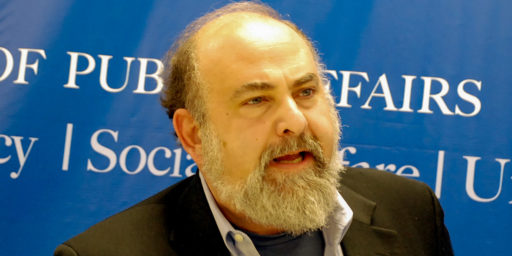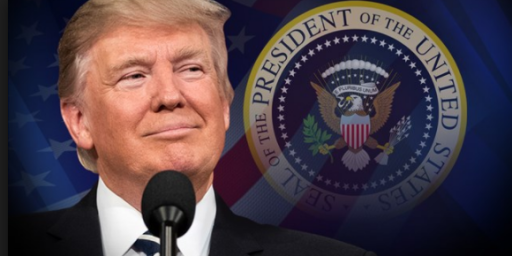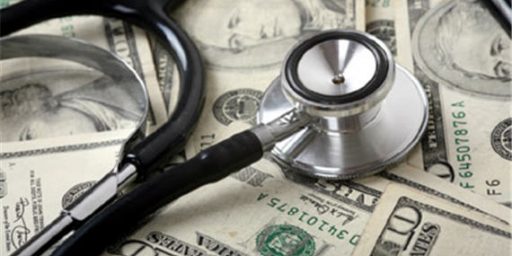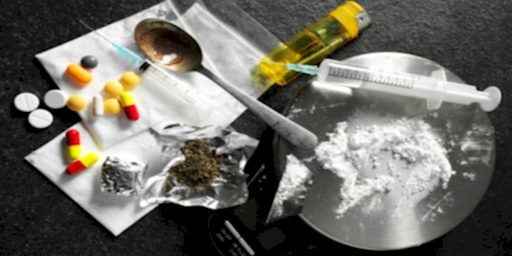Recommended Reading on the Drug War
The US drug policy gang: Dopey, Boozy, Smokey and Stupid?
 I came across the following 2007 article by Mark A. R. Kleiman from The American Interest on the topic of the drug war which I highly recommend: Dopey, Boozy, Smoky—and Stupid.
I came across the following 2007 article by Mark A. R. Kleiman from The American Interest on the topic of the drug war which I highly recommend: Dopey, Boozy, Smoky—and Stupid.
Several facts he notes that are worth pointing out:
Thirty-five years into the “war on drugs”, the United States still has a huge drug abuse problem, with several million problem users of illicit drugs and about 15 million problem users of alcohol. Illicit drug-dealing industries take in about $50 billion per year.
[…]
On top of all that, we have a highly intrusive and semi-militarized drug enforcement effort that is often only marginally constitutional and sometimes more than marginally indecent.1 That enforcement effort keeps about 500,000 Americans behind bars at any one time for drug law violations, about 25 percent of the total U.S. prison and jail population. A larger proportion of U.S. residents is doing time for drug law violations than is behind bars for all offenses put together in any country to which we’d like to be compared.
This does not sound like a successful policy to me (and if you can defend it as successful, please give it a whirl in the comments section). While I sympathetic to a host of libertarian/philosophical objections to the current prohibitionist polices of the the war on drugs,* the bottom line in terms of critiquing the policy is one of efficacy: the policy is extremely expensive and yet it is not effective. This has been empirically true for some time, but the typical response from drug warriors is that we simply aren’t fighting hard enough (which mostly means not spending enough money on a continuing doubling-down on existing approaches).
Indeed, in a book that is roughly fifteen years old now,** the authors called this “The Drug War Syndrome” and asked “Why does the United States continue to pursue the same policies in the face of failure? And why have the debate and the policy prospects become so narrow and circular, denying consideration of valuable alternatives?” (Bertram, et al., 6). While there appear to be some movement in the public debate over marijuana, we can still pretty much ask the same questions today.
Kleiman, further, rightly notes “the first step toward achieving less awful results is accepting that there is no one ‘solution’ to the drug problem” which is a key mindset change that we need. The war on drugs is unwinnable, and likewise legalization or other alternative policies will not get rid of the drug problem. The issue with drugs is not about solving a problem once and for all, it is a about managing that problem. Kleiman continues:
Any set of policies will therefore leave us with some level of substance abuse—with attendant costs to the abusers themselves, their families, their neighbors, their co-workers and the public—and some level of damage from illicit markets and law enforcement efforts. Thus the “drug problem” cannot be abolished either by “winning the war on drugs” or by “ending prohibition.” In practice the choice among policies is a choice of which set of problems we want to have.
The whole thing is worth reading in its entirety.
A few bullets that are worth noting:
- He rightly points out that not all users are addicts. Our current drug policies (and public perception) tends to follow the following logic: all users are addicts and all it takes to get addicted in one usage. However, this is not the case and to base a multi-billion dollar set of policies on such assumptions is problematic.
- We over-focus on arrests and imprisonment. This is misguided in a variety of ways (as, for example: once convicted of drug crimes the only thing a released ex-con may be able to find a job doing is dealing drugs again).
- Further, in terms of incarceration: “The current system of enforcement, which bases targeting and sentencing primarily on drug volume, should be replaced with a system focused on conduct. If we target and severely sentence the nastiest dealers rather than the biggest ones, we can greatly reduce the amount of gunfire, the damage drug dealing does to the neighborhoods around it, and the attractive nuisance the drug trade offers to teenagers.” Focusing on what he calls “nastiness” rather than just volume makes sense. Not all drug dealers are equally problematic to their community and in a world of finite resources it makes sense to focus on the ones behaving in an overtly violent fashion rather than focusing on volume alone.
He makes a variety of other observations and recommendations, but another on that stood out to me is as follows:
Let pot-smokers grow their own. Marijuana is an outlier among currently illicit drugs. Its risks are markedly smaller, its consumption is enormously more widespread, and it leads to more arrests than all the others combined—mostly for misdemeanor possession. It is also the one illicit drug that consumers could practically produce themselves. Current cannabis laws criminalize millions of otherwise law-abiding individuals and create a multibillion-dollar illicit market.
He has more to say about this in the piece, but it is an intriguing notion. It would totally destroy the illicit market that helps fuel the Mexican Cartels (not that it would put them out of business). It would also mean a massive savings for law enforcement. The reason for allow personal growth is that it would preclude massive marketing campaigns by companies trying to promote usage if the product were legalized and made into a mass-prodcued commercial product.
Again, all of this about dealing in reality, not some fantasy world wherein the use of mind-altering chemicals are forever cast into the void.
I will conclude by saying: read the whole thing.
(And if you want more reading on the subject, I do recommend the Bertram, et al. text noted below as well. It has a 1996 copyright and is therefore a bit out of date, but the basic description and critique of the US drug war remains quite valid).
*In all honesty, if you want to get high in the privacy of your own home and you do no harm to others in the process, I am not sure what the state’s legitimate interest is in your behavior.
**Bertram, Eva, et al., 1996. Drug War Politics: The Price of Denial. Berkeley, CA: University of California Press






The war on drugs is all about funding for the police/judicial/prison industry and increased government power over its citizens. It certainly has nothing to do with helping addicts, or making our society safer. The war on drugs does more damage that the drugs do.
it is also part of bait and switch to demonize certain substances while the legal stuff is actually doing more damage. Some things, like meth, should certainly be illegal. Legalizing pot is a no-brainer. Everything in between needs to be rethought.
“Legalizing pot is a no-brainer.”
Or leads to it…Three newly published studies link frequent marijuana use at a young age to an increased risk of depression and schizophrenia and other mental dieases later in life..
Here’s just one article on the subject….
http://ezinearticles.com/?Smoking-Marijuana-And-The-Risks-Of-Schizophrenia&id=802962
floyd, alcohol is legal, but alcohol use at a young age is also correlated with all sorts of bad things.
> Or leads to it…Three newly published studies link frequent marijuana use at a young age
I don’t favor legal access to any kind of drugs for minors. Use of any kind of mind altering substance during developmental growth creates all sorts of risks and problems.
That being said, the war on drugs is simply not working, and it is certainly not protecting children. I have been on tour with major rock and roll bands. I was in the nightclub business for many years. You know where I saw the most drugs? High school.
Make pot legal for adults. Redirect some of the war on drugs resources to paying special attention to those who furnish to minors.
It’s easier to get illegal drugs as a minor than alcohol. Legalize, regulate, and tax it.
john personna;
True… two wrongs don’t make a right.
Anjin-san;
18-30 is a young age. None of the studies was “refer” ing to pre-adolescent use.
BTW, legalization is not the hill I care to die on, but I still might support drug and alcohol testing for government assistance… same standards as jobs.
john personna made a fair statement about acohol, it does seem a little hypocritical , the only thing is…. one hit on a joint is more than a beer, maybe they should regulate theTHC content of weed?
Also I think it is ironic to consider drug legalization at a time when the government wants to control the sugar, fat, etc.content in regular food.
Weed is harmful, if you are going to use it you should be informed as to the effects… both short and long term.
Just like alcohol, the harmful effects are usually denied by the users, but they are apparent to the sober person in the room.
one hit on a joint is more than a beer
More what?
Also I think it is ironic to consider drug legalization at a time when the government wants to control the sugar, fat, etc.content in regular food.
Do they? How so? Can you not purchase high sugar or fat foods?
Weed is harmful, if you are going to use it you should be informed as to the effects… both short and long term.
Based on what? The poorly written article about unnamed studies you linked to? I’m familiar with the studies, and at most what marijuana does is exacerbate the symptoms or onset of schizophrenia among a subset of those already predisposed or diagnosed. “Weed is harmful” is a pretty broad assertion. Care to back it up?
Just like alcohol, the harmful effects are usually denied by the users, but they are apparent to the sober person in the room.
So alcohol is always harmful as well? Can’t one drink and not be drunk? Can’t one smoke and not be stoned? Is there no such thing as moderation?
@floyd:
The operative question is not whether marijuana is good for you or not. The operatives question is: can its usage be effectively curtailed or stopped with the follow-on question being: how much would it cost to achieve that goal?
The answer to the first question is “almost certainly not” and the answer to the second one “a lot more than we are currently spending.”
What’s worse in regards to the latter is that we already spending a ton and it isn’t curtailing or stopping drug use and it is creating a series of other problems.
As I said in the piece: we cannot solve the drug problem, we can only hope to manage it.
At the moment we are simply wasting billions.
>>>>Just like alcohol, the harmful effects are usually denied by the users, but they are apparent to the sober person in the room.<<<<<
Wkstnboie zk oernfnzlf are cohjSGD you h dglhS"GLH talk lkasregh ing ihEAGITHG about????????????
> 18-30 is a young age. None of the studies was “refer” ing to pre-adolescent use.
If an adult wants to put something unhealthy in their body, that is their business, no? Or are you advocating for a nanny state?
> but I still might support drug and alcohol testing for government assistance
Wow. Give the government the right to order people to give up a blood sample or pea in a cup?
> Weed is harmful, if you are going to use it you should be informed as to the effects… both short and long term.
Fine. Slap a warning label on it. Run commercials telling about the risks. But don’t put people in jail. The damage done by legal alcohol, tobacco and prescription drugs exceeds that done by pot by orders of magnitude. And is is not because pot is illegal. It is because it is relatively benign.
> government wants to control the sugar, fat, etc.content in regular food.
I was just at the market, there were vast amounts of unhealthy garbage for sale. Let people know the risks, then let them decide.
As I said in the piece: we cannot solve the drug problem, we can only hope to manage it.
Just like alcohol. The difference is it only took us fourteen years to realize our error with alcohol prohibition. As a nation, we have yet to learn the same lesson regarding other drugs.
One of the problems is that enforcement is an issue of social class. If Donald Trump wants to smoke a boo or indulge his guests, he is untouchable. If the fry cook at the local McDonald’s gets caught, he can be be up for a fine or imprisonment.
I don’t indulge. For many years. I have, ahem, inhaled in the past.
Locally, a year or two ago, the newspaper carried on about some tremendous drug enforcement action entailing 55 officers. The police netted a pound of pot and one gun.
Steve;
I tend to agree, and have here.
Also,I would like to point out that in the realm of human behavior…
Direct and real consequences are the only truly effective mitigators.
We, as a society tend to be enablers in a codependent relationship with the irresponsible amongst us.
Plans leak.
“pea in a cup”
Souper Idea!
Settle down… we nearly agree on this issue!
> The difference is it only took us fourteen years to realize our error with alcohol prohibition.
The war on drugs is a direct consequence of the repeal of prohibition. When the police, DAs, federal officials and prison workers who pretty much made their living off of the whiskey busting business realized that their funding, and thus their jobs were probably going away, “Marijuana, Assassin of Youth” was born.
> “pea in a cup”
Getting ready to head to the kitchen to make split pea soup… guess I need to go get busy!
Mantis;
Chill out- man, your starting to sound a little paranoid.
I’m sure it’s not “reefer madness”
Go have a beer, or a joint or what ever it takes to calm you down.
We need a better plan than just “legalize it”. We need a reversible plan if unintended consequences rear their heads. We need a plan that can be measured for success or failure. We need to address the rules and regulations that have been intertwined drug laws. For instance the laws pertaining to trucks drivers passing drug tests. If marijuana stays in the system over a long period how will those positives tests be handled?
We also not just assume the costs of any new drug management regime will save money over the one we have now. While it likely will we have no guarantees.
I wonder what drugs might be legal and what not? If the line is drawn there will always be one drug just over that line wanting to get in.
While this is a tough change we all agree some change is in order. Let’s just do it right.
Go have a beer, or a joint or what ever it takes to calm you down.
Cute, but I don’t indulge in any of that these days.
@Steve:
Let’s be fair: obviously any actual policy would be a tad more complicated than just “legalize it.”
And I would love it if we had a policy right now “a reversible plan if unintended consequences rear their heads” as well as one “that can be measured for success or failure.”
Right now we just have one, very expensive, wreck that cause more problems than it solve and that does not achieve its own goals.
> We need a better plan than just “legalize it”
For pot, not really. Legalize it and tax it. Take people who would otherwise probably be decent citizens and who are now in jail and let them out.
The pharmacology of marijuana, half-life in the system and so on is well understood, creating a body of law regarding driving, flying, practicing medicine while under the Influence is not rocket science.
Start with pot. Give it 5 years. Assess the results and take a look at other substances.
I am a clean drug addict with 20+ years of sobriety. Lord knows I have mourned enough of my former running buddies who are gone because they did not get around to quitting. I think I can claim to know the risks involved with drug use as well as anyone. I repeat, the war on drugs, is, in many instances, worse than the drugs themselves.
“We need a reversible plan if unintended consequences rear their heads.”
There certainly hasn’t been a reversible plan for the hideous unintended consequences of the War on Drugs…
Thats the way. Get everyone high so they will vote Democrat. No one in their right mind would.
Come on, Zels. You know George Washginton was a big weed grower, right? Oh yeah.
“Behind every good man there is a woman, and that woman was Martha Washington, man, and everyday George would come home, she would have a big fat bowl waiting for him, man, when he come in the door, man, she was a hip, hip, hip lady, man. “
“It’s easier to get illegal drugs as a minor than alcohol.”
That has been my experience, too.
Zels,
Beck totally hits his bong before shows. How else could anyone come up with such bizarre crap?
Steve : There are some pretty decent swab test kits that can detect relatively recent pot usage. You can also spend a few minutes to observe the person in question (do they have bloodshot eyes? is there a pot odor? etc etc). While some of the immediate symptoms of usage can have innocent explanations (my allergies and contacts destroy my eyes) the combination of those clues should be sufficient to detect consumption or at least similar to the success rate of alcohol (breathalyzers can be wildly off and even blood tests can be goofed up)..
Meanwhile up till a couple years ago high school students in my hometown were far more into pills because pills surely cannot be bad for you or why would they be legal? Yes I’ve had several high school and junior high kids tell me exactly that.. Pot is still in usage though and is still easier to score then a 21…
I have to think that legalizing grass would lower usage of the other plainly more harmful illegal drugs. Why would anyone start fooling with meth if they could just pleasantly relax instead?
And similarly with alcohol, which is far more harmful (whereas grass is a plainly more “enlightening” buzz). Notably too, I’ve known MANY more people who eventually felt they’d “outgrown” grass and quit an abusive pattern on their own than with any other mind-altering substance (including alcohol).
Grass-related violence is almost entirely limited to its commerce, not its usage. Unlike alcohol and numerous illegal substances. If people are going to abuse a substance, grass would be our preferred choice (particularly moreso than alcohol).
All that said, I’m in favor of reconfiguring the draconian laws toward the threshold between adults and minors. Harsh penalties should be reserved for failures of responsibility, rather than for indulging the fundamental human desire of altering one’s state.
Common sense on this issue is woefully overdue.